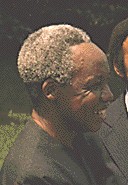| Mwalimu Julius Nyerere | |
|---|---|
 |
|
| 1st President of Tanzania | |
| In office 26 April 1964 – 5 November 1985 |
|
| Prime Minister | Post Abolished (1962–1972) Rashidi Kawawa (1972–1977) Edward Sokoine (1977–1980) Cleopa Msuya (1980–1983) Edward Sokoine (1983–1984) Salim Ahmed Salim (1984–1985) |
| Vice President | Abeid Karume (1964–1972) Aboud Jumbe (1972–1984) Ali Hassan Mwinyi (1984–1985) |
| Succeeded by | Ali Hassan Mwinyi |
| 1st President of Tanganyika | |
| In office 9 December 1962 – 25 April 1964 |
|
| Prime Minister | Rashidi Kawawa |
| Preceded by | Office Created |
| Succeeded by | Office Abolished |
| 1st Prime Minister of Tanganyika | |
| In office 1 May 1961 – 22 January 1962 |
|
| Monarch | Elizabeth II |
| Preceded by | Office Created |
| Succeeded by | Rashidi Kawawa |
| 1st Chief Minister of Tanganyika | |
| In office 2 September 1960 – 1 May 1961 |
|
| Monarch | Elizabeth II |
| Preceded by | Office Created |
| Succeeded by | Office Abolished |
| Personal details | |
| Born | 13 April 1922 Butiama, Tanganyika |
| Died | 14 October 1999 (aged 77) London, United Kingdom |
| Resting place | Butiama, Tanzania |
| Nationality | Tanzanian |
| Political party | CCM |
| Spouse(s) | Maria Nyerere |
| Children | Andrew Anna Magige John Makongoro Madaraka Rosemary |
| Alma mater | Makerere University University of Edinburgh (MA) |
| Profession | Teacher, Politician |
| Religion | Roman Catholic |
| Website | http://www.juliusnyerere.info |
Julius Kambarage Nyerere (13 April 1922 – 14 October 1999) was a Tanzanian politician who served as the first President of Tanzania and previously Tanganyika, from the country's founding in 1961 until his retirement in 1985.
Born in Tanganyika to Nyerere Burito (1860–1942), Chief of the Zanaki,[1] Nyerere was known by the Swahili name Mwalimu or 'teacher', his profession prior to politics.[2] He was also referred to as Baba wa Taifa (Father of the Nation).[3] Nyerere received his higher education at Makerere University in Kampala and the University of Edinburgh. After he returned to Tanganyika, he worked as a teacher. In 1954, he helped form the Tanganyika African National Union.
In 1961, Nyerere was elected Tanganyika's first Prime Minister, and
following independence, in 1962, the country's first President. In 1964,
Tanganyika became politically united with Zanzibar and was renamed to Tanzania. In 1965, a one-party election returned Nyerere to power. During the first years Nyerere created a single-party system and used "preventive detention" to eliminate trade unions and opposition.
Nyerere issued the Arusha Declaration, which outlined his socialist vision of ujamaa that came to dominate his policies. The policies led to a collapsing economy, systematic corruption,
and unavailability of goods. In the early 1970s Nyerere ordered his
security forces to forcibly transfer much of the population to
collective farms and, because of opposition from villagers, often burned
villages down. The campaign pushed the nation to the brink of starvation and made it dependent on foreign food aid.
In 1985, after more than two decades in power, he relinquished power
to his hand-picked successor. Nyerere left Tanzania as one of the
poorest, least developed, and most foreign aid-dependent countries in
the world.[4] He remained the chairman of the Chama Cha Mapinduzi. He died of leukemia in London in 1999. In 2009, Nyerere was named "World Hero of Social Justice" by Miguel d'Escoto














No comments:
Post a Comment